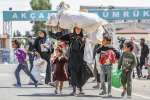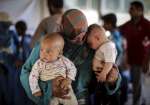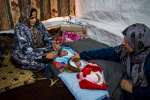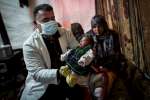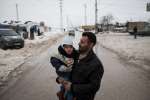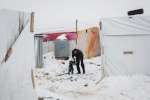Syrian refugee in Lebanon decides to head to Turkey to risk flight to Europe.
News Stories, 21 July 2015
SHOUEIFAT, Lebanon, July 21 (UNHCR) – In the hall of her bare apartment, five packed suitcases lay neatly on the floor. After four crushing years of living in Lebanon as a refugee, Hanan* had made up her mind. She was going to leave, no matter the cost.
"I'll go anywhere; Italy, Greece, I don't care. I have officially hit rock bottom," she said.
Hanan had just booked four airplane tickets to Turkey. She sold her last pieces of jewelry to do so. "My plan is to link up with a smuggler there who can put me and my three children on a boat to Europe… I haven't slept in three nights," she said. She paused and looked thoughtful: "My brain is constantly at work, calculating, recalculating."
Hanan is an architect. Back in Syria, she refurbished and sold old houses in and around her hometown. She had a good life with her husband and children in the suburbs of Damascus. The family spent their summers in their vacation home in Bloudan – a former holiday destination for Syria's middle class.
Her husband was the owner and CEO of one of Syria's biggest air freshener factories, a 200-employee business.
She opened a leather briefcase and placed it carefully on her lap. "This is all that is left from the factory," she pulled out a worn out air freshener, a branded cotton bag, and two scented candles.
"My children wanted to throw them away but it would have driven their father completely mad, I couldn't let them."
Her husband is now in Sweden. He fled there in 2014 thinking he could eventually manage to bring his family with him. He has since been on a waiting list in a reception centre at the Swedish borders.
"He loved life and he loved people," Hanan choked; "he's completely given up now, he just could not accept our new reality."
When Hanan first arrived in Lebanon in 2012, she told her story to a Lebanese man, "tears ran down his face as I helplessly sat there with my husband and children and told him how we didn't even manage to bring our clothes."
For close to two years, he opened a home to them in Bchamoun, in the southern outskirts of Beirut. "He bought us a heater, a washing machine, and gave us $200," she remembered, "I started collecting goods from generous neighbours; the concierge gave me a carpet, the next door neighbor a couple of chairs."
But this arrangement came to an end in 2014. "He needed the apartment for his own family," she explained.
Hanan eventually had to work four jobs to try and pay the rent of the apartment she moved into with her children. She cleaned, gave cooking classes, did secretarial work, and volunteered to help other refugees, but still struggled each month to make ends meet.
"At first I was embarrassed to work as a cleaner or do any other job that I wouldn't have considered doing only a few years ago, but I can't compare my current situation to my past life. My priority is my children's well-being."
Like hundreds of thousands of Syrian professionals, Hanan could not practice her trade in Lebanon. However, she was able to negotiate the enrolment of her children in a nearby school free of charge. "This year they did so well that they got exempt from the final exams. My eldest got straight As," she says with pride.
But the school capacity was overstretched, and they started to ask for tuition fees. "I simply could not afford it, I barely managed to cover the rent working four jobs and, with food aid reductions, I was often forced to tell my children that dinner was bread and olives," she smiled, "can you imagine?"
Hanan told me she had overstayed her residency permit and decided not to renew it. "I cannot think about having to pay $200." She couldn't afford it, like most Syrian refugees in Lebanon.
"What would you do if you were in my shoes? I am counting the hours until we leave," she lit a cigarette. "All we have left are beautiful memories of rose blossoms and cherry trees," she said.
Hanan can no longer be reached on her phone line.
*Name changed for reasons of protection
By Dana Sleiman, Lebanon



















